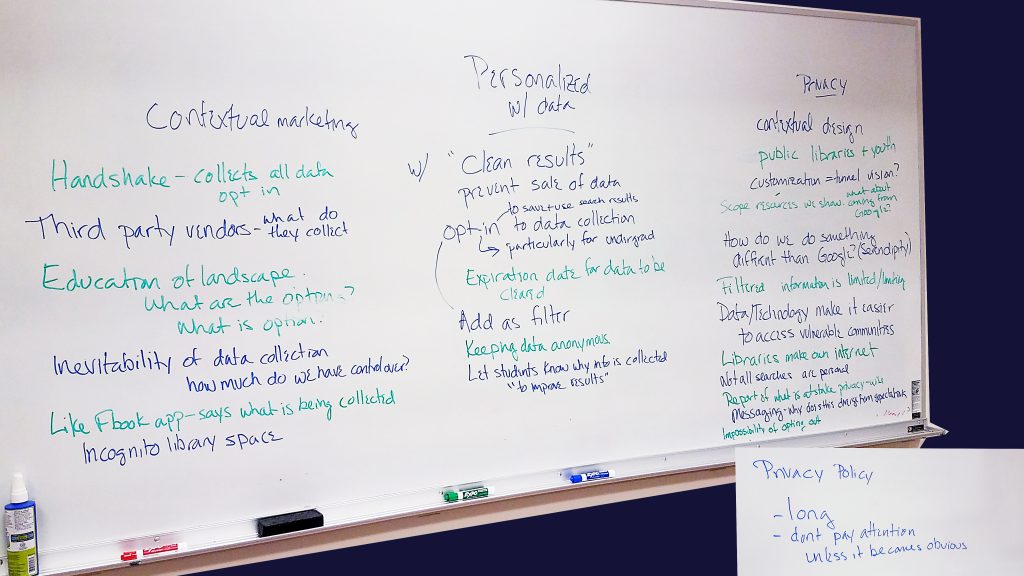Introduction
January 29th, 2018 over 30 people from five academic libraries gathered together to discuss how to protect privacy while improving the user experience within library digital spaces. To prepare for the discussion, two articles were provided “ Privacy and User Experience in 21st Century Library Discovery” by Shayna Pekala and a blog article entitled “Does the best library web design eliminate choice?” by Michael Schofield. There were two overarching themes developed within these two sources; namely, privacy and intellectual freedom (Pekala) and personalization vs. privacy (Schofield).

Main Points
-
-
-
Commercial Relationships
In today’s virtually inclined society, libraries depend upon outside vendors for discovery services that both catalogue local holdings and provide electronic subscriptions and open access resources. These vendors (EBSCO, Summon, WorldCat, Primo) each maintain their own privacy policy which takes the protection of the user and their intellectual freedom out of the hands of the library when the user transitions from the library website into the vendor’s web space. With this in mind, there is the argument that removing personalization from the library website’s interaction design to protect privacy is ineffective, because the users’ data is being collected, utilized and re-purposed by these outside vendors during the same session in which they are interacting with the library’s primary web interface.
-
The Irony of Transparent Privacy
Libraries are uniquely positioned to provide privacy transparency for their users given their mission is to promote literacy, research, and intellectual freedom. On the other hand, business-driven models emphasize data mining with the primary goal of furthering growth and profit margins. Taking that motivation into consideration, business-driven models emphasize the user experience to enhance the pleasure and efficacy of a product interaction usually by incorporating anticipatory design and contextual marketing tactics. What can libraries gain from examining business-driven models in order to provide enhanced access and to simplify the research process while still honoring the user’s right to intellectual freedom? Ideas include:
-
Permission based opt-in for personalized results
- Tied to a unique ID
- Could facilitate more focused preliminary research
- Expiration date for search histories (ie: graduation year)
- Gives the user the option to store their search history, which is expected behavior
-
Filtering results and widgets based on search patterns
- Not tied to a unique ID.
- Libraries would collect and analyze anonymous user data without identifying them specifically.
- Could be used to identify user workflow trends
- Would serve to enhance recommendations and content blocks to improve browse-based navigation and search.
-
User can turn off filtering or personalized results with one click
- Similar in concept to a private / incognito browser
- Increase possible search results
- Results are not exposed to human or AI imposed relevancy rankings
- Reduction in the chance for tunnel vision when doing research
- Concern about information overload, since results will be “raw” and most users only look at page 1-3 of a search. The counterpoint to this argument is that the library is charged with developing students who can do real research. By surfacing results and simplifying access, the library is reducing the academic ardor of a student’s cognition.
-
Data driven decisions
- Use analytics based tools to monitor and analyze page views, session duration, and user workflows
- Use this information to improve the user interface / information architecture / content strategy
- Privacy policies that are simply put
- Share how data is processed and used in an easy to understand format would assist with comprehension about what is actually being collected and shared.
- In this example, Facebook shares a list of App Permissions required to update its phone based software. This could be mined to quickly share what the library privacy policies are with a link to the full language.
-
-
Divert from the Norm – Fair, Equitable and Neutral Search
How can libraries provide a search experience that differs from expectations defined by common browser-based Google or Bing searches?
-
The beauty of serendipity
User are barraged with highly targeted results in their daily encounters with search engines and social apps. Consider the refreshing nature of an interface that encourages the user to explore or do research in a new topic or area of interest. The caveat to this approach is that the search experience within the library would need be paired with increased education, since libraries would be diverting away from a well-defined paradigm. Does this in turn decrease the likeliness of comprehension and consequently access without explanation?
-
Removing commercially-biased search results
from the equation in an effort to promote “clean results” the user can trust. In line with this idea, Safiya Umoja Noble had written a newly published book entitled Algorithms of Oppression where she explores the notion that Google’s search results are not fair, equitable, or neutral and she proposes a public interest search engine that would remove advertising dollars from page rankings.
-
-
Raise awareness of privacy concerns in a digital era.
-
Information literacy workshops
- Hoxes, Memes, and Bots
- How to get around sharing data
-
Surfacing privacy concerns throughout the web interface
-
Publish Reading lists
- Libraries
Pekala, S. (2017). Privacy and User Experience in 21st Century Library Discovery. Information Technology and Libraries, 36(2), 48. https://ejournals.bc.edu/ojs/index.php/ital/article/view/9817/pdf - “Does the Best Library Web Design Eliminate Choice?” 2015. LibUX (blog). September 11, 2015. (mentioned by Michael Schofield (LibUX) speaking at Designing for Digital in 2016) https://libux.co/best-library-web-design-eliminate-choice/
- Library Privacy Checklists: http://www.ala.org/advocacy/privacy/checklistsLibrary Freedom Project is dedicated to eliminating mass surveillance from our libraries and communities. https://libraryfreedomproject.org/resources/
- Libraries
- Personal & Academic Privacy
- Series of Choice360 podcasts on Protecting Patron Privacy (Aug.-Sept. 2017): http://www.choice360.org/librarianship/podcast/all?q=privacy
- “Go To Hellman: Reader Privacy for Research Journals Is Getting Worse.”https://go-to-hellman.blogspot.com/2017/03/reader-privacy-for-research-journals-is.html
- The Invasive Valley of personalization: http://busynessgirl.com/the-invasive-valley-of-personalizatio/Berreby, David. 2017.
- “Click to Agree with What? No One Reads Terms of Service, Studies Confirm.” The Guardian. March 3, 2017. http://www.theguardian.com/technology/2017/mar/03/terms-of-service-online-contracts-fine-print.
- Terms of Service; Didn’t ReadA “user rights initiative to rate and label website terms & privacy policies, from very good [Class A] to very bad [Class E].” Also offers a web browser pluginhttps://tosdr.org/
- Search
- Algorithms of Oppression: How Search Engines Reinforce Racism. Safiya Umoja Noble 2018. NYU Press. http://nyupress.org/books/9781479837243/Clark, J. A. (2016).
- Anticipatory Design: Improving Search UX using Query Analysis and Machine Cues. Weave: Journal of Library User Experience, 1(4). https://doi.org/10.3998/weave.12535642.0001.402 https://quod.lib.umich.edu/w/weave/12535642.0001.402?view=text;rgn=main
- Educational
- Data Privacy Project has a “Historical Overview” + learning modules https://dataprivacyproject.org/learning-modules/historical-overview
- “Privacy Paradox from the Note to Self Podcast.” https://project.wnyc.org/privacy-paradox/
- “DIY Feminist Cybersecurity.” Developed by Noah Kelley. https://hackblossom.org/cybersecurity/
- RA21: Resource Access for the 21st century
RA21’s mission is to align and simplify pathways to subscribed content across participating scientific platforms. RA21 will address the common problems users face when interacting with multiple and varied information protocols. UX study from STEM researcher perspective, including links to resources from web: https://ra21.org/wp-content/uploads/2017/09/RA21-UX-Sept-17.pdf
-
-
Stay aware of the larger context re: education, privacy & society
Large-scale data analysis of student populations is growing among colleges and universities, to support everything from student retention to career-matching. The example of Handshake at Simmons came up — a career-services platform that makes student data visible to prospective employers (potentially including GPA). An Inside HigherEd article detailed the controversy around this service.
Larger societal opinions towards digital privacy are generally pessimistic, with many Americans struggling to understand how their information is being used by companies, and a majority feeling that consumers have lost control of their private information. The Pew Research Center has put out a number of reports tracking shifts in online privacy and safety.
-
-


